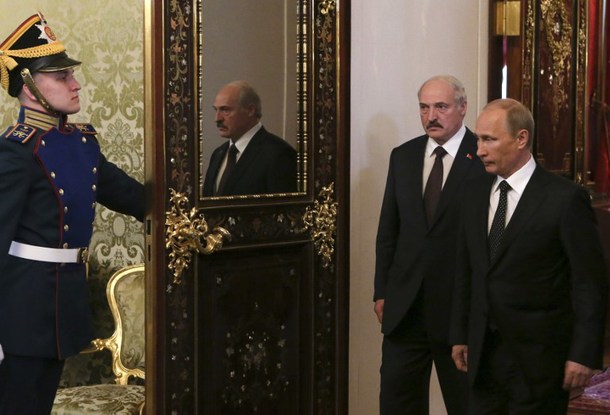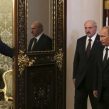
Lukashenka’s New Victory and a Fight for Belarusian Identity
Publication: Eurasia Daily Monitor Volume: 11 Issue: 90
By:

Less than ten days after Russia declined to cancel export duties on refined oil products that Belarus sells to the West (see EDM, May 9), President Alyaksandr Lukashenka managed to wrest some critical concessions from the Kremlin. Following his May 8 visit to Moscow, Lukashenka announced that Russia agreed to phase out its export duties. As early as 2015, about half of the overall current sum ($3.3 billion) transferred by Belarus to Russia’s budget will stay in Belarus. Russia and Belarus will then renegotiate the trade in refined oil, and Lukashenka expressed his belief that, in 2016, the entire fee for exporting products made from Russian oil will be gone. In addition, Lukashenka was assured by the Kremlin that the two Belarusian oil refineries will receive enough Russian oil for full-capacity operation (currently 23 million tons per year), and that from now on 25,000–30,000 Geely cars—a Chinese model assembled in Belarus—will be sold in Russia each year. Once a larger Geely factory is commissioned, for which China has lent Belarus $250 million, the output will reach about 250,000 cars a year (https://news.tut.by/politics/398287.html). Finally, Russia agreed to lend Belarus $2 billion for ten years with a 4-percent interest rate to prop up Belarus’s hard currency reserves (https://news.tut.by/economics/398288.html).
While in Moscow, Lukashenka attended a summit of the Collective Security Treaty Organization (CSTO). One member country president (Nursultan Nazarbaev of Kazakhstan) was missing, but the other heads of state in attendance discussed the crisis in Ukraine. During the meeting, Lukashenka likened the events of May 2 in Odessa, Ukraine (where some people perished in a building set on fire), to several Belarusian villages, notably Khatyn, burned with their residents inside by the Nazis during World War II (https://news.tut.by/politics/398203.html). Although this rhetorical parallel echoed Russia’s official stance on the situation in eastern Ukraine, one of the national leaders Lukashenka explicitly congratulated on the occasion of the May 9 Victory Day was acting president Olexander Turchynov of Ukraine (https://news.tut.by/politics/398141.html). Unlike Russian leaders, Lukashenka has not been calling Turchynov’s government a “Kyiv junta.”
The events in Ukraine have exacerbated the debates about Belarus’s geopolitical leanings and identity symbols. One peculiar sign of this development concerns “Ribbons of St. George” (RSG—Georgiyevskaya lentochka), one of the most recognizable and respected symbols of military valor in modern Russia. While it can be traced back to the Order of St. George (established in 1769 as the highest military order of the Russian Empire), today it is widely associated with the commemoration of the Great Patriotic War, the Russian name for the 1941–1945 events on the eastern flank of the European theater of World War II. During the May 9 Victory Day celebrations, wearing RSG has become habitual for war veterans and for younger people in both Russia and Belarus. Furthermore, many in eastern Ukraine have recently made a statement of wearing RSG as a symbol opposing the blue-yellow ribbons that symbolize Ukraine’s national colors.
During the run-up to this year’s May 9 celebrations, a Gomel-based unit of the Belarusian Republic’s Youth Association received a recommendation from its headquarters to wear red-green ribbons on May 9, reflecting the colors of the Belarusian national flag. Whereas, Sergei Gaidukevich, the leader of the Liberal Democratic Party, historically a political clone of the same-named Russian party headed by Vladimir Zhirinovsky, declared that he and his party would keep on wearing RSG as “it is a symbol of our common history and victory in the war, not that of some pro-Russian forces” (https://nn.by/?c=ar&i=127899). Subsequently, in the opposition media, this clash of opinions was elevated to the status of an ideological battle. Consequently, in Mogilev, yet another regional capital of eastern Belarus, it was decided to pass around both red-green ribbons and RSG (https://news.tut.by/society/397988.html).
The second sign of an ideological battle for Belarus’s allegiance is the article by Yury Baranchik, director of the Belarusian Internet portal Imperia (Empire) (https://www.imperiya.by/about.html) connected to the Russian online newspaper Vzglyad. Baranchik claims that just as the Ukrainian national blueprint is nothing more than an anti-Russian project devised by the security apparatus of Austria-Hungary, the Westernizing Belarusian blueprint has a similar thrust. Both have to be rejected, therefore, and so should the three-pronged concept of Russian, Belarusian, and Ukrainian ethnicities growing from a single East Slavic/Kievan source. According to Baranchik, the niche occupied by Belarus along a civilizational fault line does not allow it any other option but to be either Russified or Polonized. However, “it was confronting Poland that incited in the Belarusian people a longing for independence and freedom, a longing that assumed a form of return to Russia.” According to Baranchik, most Belarusians are effectively Russians, whereas the pro-Western opposition that celebrates, on March 25, the anniversary of the Belarusian People’s Republic (a non-recognized state that existed for several months under German occupation during World War I) embraces collaboration and treason (https://www.vz.ru/opinions/2014/5/7/685652.html).
In terms of cross tables derived from the March 2014 national survey by the Independent Institute for Socio-Economic and Political Studies, 35 percent of Belarusians trust Lukashenka and are simultaneously in favor of Russia; 6 percent trust Lukashenka and are in favor of the European Union; 22 percent do not trust Lukashenka and are in favor of the EU; and, finally, 16 percent do not trust Lukashenka and are in favor of Russia. Yury Drakakhrust of the Belarusian service of Radio Liberty calls the last group the “most curious one” (https://www.svaboda.org/content/article/25377809.html). Definitely, the above-quoted Baranchik is a mouthpiece for that particular group within Belarus.
But leaving aside such ideological arguments with geopolitical overtones, Belarus is now hosting the ice hockey world championship, which members of the European Parliament and the United States Congress tried unsuccessfully to cancel because of Minsk’s human rights violation (https://naviny.by/rubrics/politic/2014/05/09/ic_articles_112_185440/). If they had succeeded, ordinary Belarusians would have been robbed of this genuine source of national pride devoid of geopolitical leanings.




